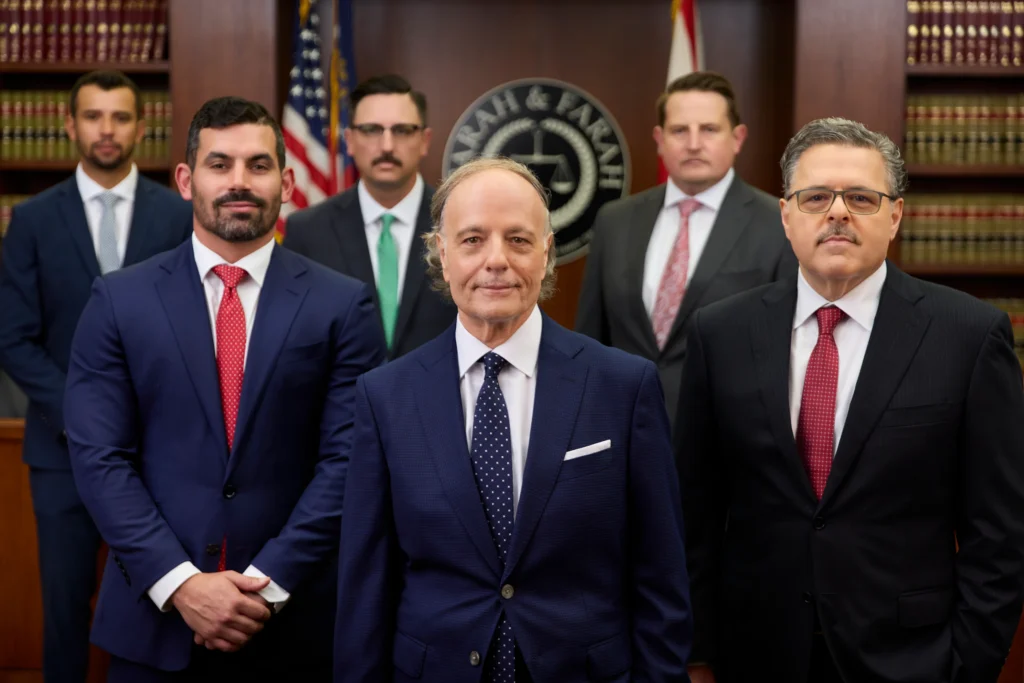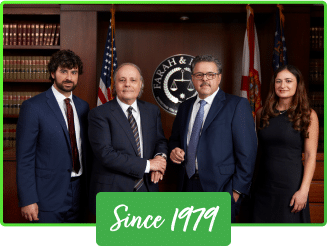Wrongful Termination Attorneys
Being fired can be devastating; being wrongfully terminated can be an even more mind-reeling experience for you and your family. Even though all 50 states practice the employment-at-will doctrine, employers are held accountable for terminating employees in violation of state, local, and federal law.

FREE CASE REVIEW
Home > Labor Law Attorneys > Wrongful Termination Attorneys
Why Should You Consult a Wrongful Termination Lawyer?
Employers who violate the law should be held accountable if they have unjustly used their position to terminate an employee. If you believe you’ve been let go for illegal reasons, it’s important to reach out to a labor law attorney like Farah & Farah’a T’Keara Watson and Allison Brieter. Experienced wrongful termination attorneys have a clear understanding of your legal rights, can lay out your options, and talk you through the key factors that can help build a strong case with a favorable outcome.
Anyone who is deciding whether or not legal action should occur should seek advice at Farah & Farah. Contact us to schedule your free consultation and review your legal options.
What To Expect With Farah & Farah’s Wrongful Termination Attorneys
With no exceptions, employees are protected against wrongful termination from employers, even under the “at-will” doctrine–that allows employers to terminate employees without warning or reason. So, if you have faced unlawful dismissal, seek legal advice to understand if you have a case.
Farah & Farah attorneys have extensive knowledge of state and federal labor laws. Our wrongful termination lawyers are dedicated to ensuring that you receive the compensation you deserve for the physical, emotional, and psychological damages done to you by a wrongful termination.
What Is Wrongful Termination?
Wrongful termination is when an employer lets an employee go for an unlawful reason. Even if the state follows the employment-at-will doctrine, employers cannot dismiss an employee with reasons that violate state, local, or federal law. The termination reasons can be considered wrongful if the employer fired an employee because they:
- Filed a harassment claim
- Exercised their workplace rights
- Were on FMLA leave
- Refused to participate in an illegal act
- Refused to commit a safety violation
- Blew the whistle on illegal, unsafe, fraudulent, or immoral acts
- Took time off for voting, jury duty, or another civic duty
- Filed a workers’ comp claim
- Legally refused overtime
- Filed an unpaid overtime claim
Discrimination and Wrongful Termination
It is also illegal for non-exempt employers to fire an employee for being a member of a protected class per the Civil Rights Act of 1964. These protected classes include:
- Race
- Color
- Religion
- Sex
- National origin
Other laws and Supreme Court decisions have added disability, pregnancy, age, sexual orientation, and transgender status to that list.
What Is the Employment-At-Will Doctrine?
Also called “at will employment,” the employment-at-will doctrine was created to place the employer and employee on equal terms. While the employee is free to resign from their position at any time, employers can terminate employees in the same manner. Unfortunately, the intended “equality” of the at-will doctrine began to degrade during the Industrial Revolution. By the mid-1900s, courts and legislatures began realizing employers had more power than employees. Thus, unions were created to protect employees’ positions from employers.
Which States Are At-Will Employment States?
All 50 states follow the employment-at-will doctrine. However, states do have individual laws and procedures regarding employment, and some have created exceptions to the at-will doctrine. These policies were created to provide employees with added protection from being terminated for certain reasons.
What Are the Three Employment-At-Will Exceptions?
There are three major exceptions that some states put into place as exceptions to the at-will doctrine. These are the public policy exception, the covenant of good faith exception, and the implied contract exception.
Public Policy Exception
Employers cannot terminate an employee who goes against a well-established public policy of the state. These policies will vary from state to state. Some states have public policy exceptions that deny employers the right to dismiss a worker receiving workers’ compensation, and other states have a public policy where employers cannot fire an employee if the employee refuses to violate a law at their request.
Covenant of Good Faith Exception
Some states have integrated the exception of the implied covenant of good faith and fair dealing with every employment. This exception is a broader term than the implied contract exception. It disallows the employer from disciplining or terminating an employee in bad faith or with malicious intent.
Implied Contract Exception
The implied contract exception to the employment-at-will doctrine protects employees from wrongful termination if the employer has expressed–orally or in writing–employment terms and conditions that will be followed through if and when unfavorable actions occur.
Some states will accept oral and written assurances from employers of the terms that provide job security to the employee. Other states limit the implied contract exception to written documentation in the handbook. The handbook should outline the specified circumstances or provisions where employees will face disciplinary actions or termination; the employer will adhere to the company’s procedures before taking any coercive measures.
Does Florida Have Employment-At-Will Exceptions?
No, Florida does not have any exceptions to the at-will doctrine.
Does Georgia Have Employment-At-Will Exceptions?
Georgia also does not have any exceptions to the employment-at-will doctrine.
$2+ BILLION IN RESULTS

What Laws Protect Me From Wrongful Termination?
Laws empower employees to fight against wrongful termination and provide legal recourse options and protection. Each law conveys that unlawful employee dismissal will not be tolerated and that all employees must be treated fairly.
Title VII of the Civil Rights Act of 1964
Title VII protects employees in the private and federal sectors. Employers with 15 or more employees must legally comply with The Civil Rights Act.
Title VII states that nobody should be discriminated against based on race, genetic information, color, national origin, religion, or gender. Protection under Title VII covers all decisions regarding the terms and conditions employees are employed under, including, but not limited to, recruitment, terminations, and selections.
Equal Employment Opportunity Commission (EEOC)
If you have been terminated due to discrimination, retaliation, or harassment, file a claim with the EEOC. EEOC was established to enforce Title VII’s (along with other federal laws like ADEA and ADA) requirements for private and federal employers. Individuals can file a lawsuit under Title VII to seek damages, barring relief, and unbiased relief. The Commission’s role is to investigate charges and assess all allegations in the charge before announcing their finding.
Age Discrimination in Employment Act (ADEA) of 1967
ADEA protects applicants and employees 40 years and older from ageism and applies to employers with 20 or more employees. Being discharged from employment due to age is illegal under the ADEA.
Americans With Disabilities Act (ADA) of 1990
Employers who have employed 15 or more workers must comply with the ADA. The ADA offers comprehensive mandates to eliminate discrimination against people with disabilities. It ensures equal opportunities in employment, public services, accessibility to benefits and buildings, and telecommunications. Additionally, the ADA protects against retaliation and wrongful termination for those who exercise their rights.
Occupational Safety and Health Act of 1970
The Occupational Safety and Health Act of 1970 was enacted to require employers to ensure that employees work in a safe and nonhazardous environment. This act requires employers and employees to follow the standards, rules, and regulations that apply to their work conduct. The Occupational Safety and Health Administration (OSHA) functions as an enforcer of such laws.
22 states have planned and executed safety programs approved by OSHA. Any business with more than ten employees is required to keep OSHA safety records. You have whistleblower protection if you believe you were discharged from your position unlawfully after filing a claim against your employer because of unsafe or illegal practices or products. Please contact OSHA immediately and file a report of your termination.
OSHA Exemptions
Exempt employers that do not fall under OSHA have businesses with less than ten employees, a low-hazard workplace, and did not have more than ten employees in the prior fiscal year (less likely to perform record-keeping for the current year). But, those small businesses are still encouraged to practice safety and health procedures.
How Does Florida Law Protect Employees From Wrongful Termination?
The Florida Civil Rights Act, Sections 760.10, exists to protect individuals in a workplace from unlawful termination, harassment, discrimination, and retaliation related to:
- Age
- Race
- Color
- Disability
- Marital status
- National origin
- Pregnancy
- Gender
- Religion
According to the Florida Civil Rights Act, anyone subjected to any alleged discrimination has 180 days to file a case against employers, colleagues, customers, or vendors with the Florida Commission on Human Relations (FCHR).
Since Florida does not have an OSHA-approved state plan, employers must comply with the standards placed under the OSHA. Employers are required to identify and resolve employee health and safety issues, hang posters and warnings, educate and train employees, reduce the risk of hazards, supply protective gear, etc.
Florida Commission on Human Relations
The FCHR was created with the vision of eliminating all discrimination in the state. FCHR staff have the authority to enforce The Florida Civil Rights Act of 1992, The Florida Human Rights Act of 1977, and others. If an employee files a discrimination inquiry, FCHR will suggest mediation between all involved parties to come to one of three agreements: negotiated settlement agreement, impasse, or independent settlement agreement.
Florida Employment-At-Will Doctrine
Florida’s employment-at-will doctrine allows the employer to terminate employees for any or no reason but with limitations. The employer cannot dismiss the employee from employment due to discrimination, retaliation, whistle-blowing, or violation of local, state, or federal law.
Employers also cannot breach the contracts of employees with written or specific contracts containing clauses or amendments that provide employment security. Employees must abide by the procedures labeled in the written agreements.
How Much Time Do I Have To File a Report on Wrongful Termination in Florida?
The statute of limitations to file a report with the EEOC and FCHR is up to 300 days on wrongful termination due to discrimination or retaliation from the date the employee became aware of the adverse employment action. But, the EEOC requires a report within 180 days from the most recent discriminatory act.
Georgia Employment-At-Will Doctrine
Georgia’s employment-at-will doctrine allows the employer to terminate employees for any or no reason but with limitations. The employer cannot dismiss the employee from employment due to discrimination, retaliation, whistle-blowing, or violation of local, state, or federal law.
Employers also cannot breach the contracts of employees with written or specific contracts containing clauses or amendments that provide employment security. Employees must abide by the procedures labeled in the written agreements.
How Much Time Do I Have To File a Report on Wrongful Termination in Georgia?
The statute of limitations to file a report with the EEOC is up to 180 days on wrongful termination due to discrimination or retaliation from the date the employee became aware of the adverse employment action.
for the family of a motorcycle rider killed by a driver who ran a red light
for a passenger injured when a truck struck a motorcycle
in the wrongful death of a wife who died in a motorcycle collision with a dump truck
for a rider who suffered a severe leg injury when struck by a car
for a rider injured when a careless driver pulled out in front of the motorcycle
What To Do if You Have Been Wrongfully Terminated
Being dismissed from your job for unlawful reasons can be emotionally and financially damaging to you and your family. Losing employment can even negatively impact your career status and future employment opportunities. With cases differing from one to the next, it is crucial to understand your rights and if there are legal options you can take against any adverse workplace events done to you.
By seeking legal advice, you and your family can better grasp whether you have a case. You may have a ruling to receive compensation such as lost wages, unpaid wages, or punitive damages. Our team at Farah & Farah has the benefit of large firm resources while providing the attention to detail and personal interactions you would expect from a small firm. We’re also experienced in and understand the intricacies of labor and employment laws.

Contact Farah & Farah’s experienced wrongful termination attorneys, such as labor law attorneys Alison Breiter and T’Keara Watson, today for a free consultation if you’re in Florida or Georgia. We are dedicated to securing the justice and compensation you deserve. You won’t have to pay a dime unless your case is successful.
Civil Rights Discrimination Attorneys
Workplace Discrimination Attorneys














FREE CASE REVIEW
